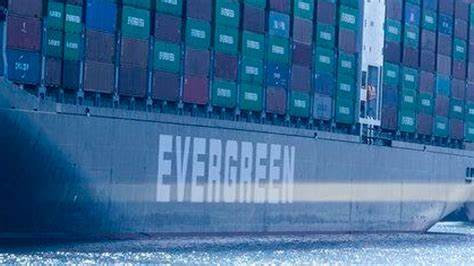
As shipping schedules get affected, exporters choose to wait and watch the Suez canal drama
The Suez Canal is the primary route for ships moving between India and Europe and the traffic hold-up has begun to affect the tight schedules of commercial shipping lines operating in India. But exporters remain hopeful that a backlog of up to 7-10 days can be overcome with some planning and speedy clearance by the Customs authorities.
Commercial shipping schedules have gone haywire due to a large container ship, the MV Ever Given, getting stuck on the Suez Canal, one of the busiest maritime superhighways in the world, amid high winds during a dust storm. But Indian merchandise exporters, as well as importing companies, are keeping their fingers crossed, hoping that a 7-10 day backlog will be overcome.
“As per the present information we have, it may take 3-4 days minimum to resolve the situation. With the logjam already ongoing for three days and 50-plus ships (normally) crossing through the canal every day, it has already started affecting shipping schedules,” A.V. Vijaykumar, Chairman of the Federation of Freight Forwarders’ Associations in India (FFFAI), said.
Currently, ships take an average of 17-18 days to travel between ports on India’s west coast and Western European ports such as Rotterdam. But the journey’s duration also depends on transshipment, whereby ships make multiple stops along the way. Egypt’s Port Said, at the northern end of the Suez canal, is an important stopover and freight forwarders say that the waiting line of ships is getting longer there, and may further extend the delay.
On the other hand, customs agents say the goods clearance time at major ports such as JNPT in Mumbai will increase after the current challenge ends as authorities will face a sudden rush of traffic. As a result, from next week onwards, specific industries may start seeing their supply chains get affected.
“Even if there is a delay for 3-4 days the entire supply chain gets affected. If this continues, the import dependency of Indian manufacturers in the short to mid term will be affected just as scheduled export shipments will be delayed in departing from Indian ports,” Vijaykumar added.
Commercial shipping schedules have gone haywire due to a large container ship, the MV Ever Given, getting stuck on the Suez Canal, one of the busiest maritime superhighways in the world, amid high winds during a dust storm. But Indian merchandise exporters, as well as importing companies, are keeping their fingers crossed, hoping that a 7-10 day backlog will be overcome.
“As per the present information we have, it may take 3-4 days minimum to resolve the situation. With the logjam already ongoing for three days and 50-plus ships (normally) crossing through the canal every day, it has already started affecting shipping schedules,” A.V. Vijaykumar, Chairman of the Federation of Freight Forwarders’ Associations in India (FFFAI), said.
Currently, ships take an average of 17-18 days to travel between ports on India’s west coast and Western European ports such as Rotterdam. But the journey’s duration also depends on transshipment, whereby ships make multiple stops along the way. Egypt’s Port Said, at the northern end of the Suez canal, is an important stopover and freight forwarders say that the waiting line of ships is getting longer there, and may further extend the delay.
On the other hand, customs agents say the goods clearance time at major ports such as JNPT in Mumbai will increase after the current challenge ends as authorities will face a sudden rush of traffic. As a result, from next week onwards, specific industries may start seeing their supply chains get affected.
“Even if there is a delay for 3-4 days the entire supply chain gets affected. If this continues, the import dependency of Indian manufacturers in the short to mid term will be affected just as scheduled export shipments will be delayed in departing from Indian ports,” Vijaykumar added.
While 99 per cent of all commercial shipments to and from India are handled by foreign shipping lines, more than 2 dozen ships currently travelling from or en route to India may be affected by the mega traffic jam at the Suez Canal, according to the Container Shipping Lines Association (India)(CSLA), the apex body representing foreign container shipping lines operating in India. Gobal shipping giant Maersk said on March 25 that close to 200 ships are stuck on either end of the 193-km-long canal, waiting to cross.
However, the mishap is not expected to majorly affect India’s crucial oil and refined petroleum imports. “Iraq, Saudi Arabia and the United Arab Emirates — the top three sources of petroleum for India — all sit on the Persian Gulf and trade links to these areas continue smoothly. Oil terminals receiving incoming shipments are also functioning properly,” a senior CSLA functionary, said.
Indian sailors safe
Meanwhile, the government has gotten in touch with the Egyptian authorities over the health and safety of the 25-member crew of the ship, all of whom are Indian. “All the crew are safe and accounted for. They are also in excellent health. The firm in charge of the ship’s management and the operator of the vessel have informed us that the Captain is helping with the efforts to salvage the ship,” a senior official stated.
The Indian embassy in Cairo is also in touch with Egypt’s state-owned Suez Canal Authority, which owns, operates and maintains the Canal, he added.
In keeping with the multinational nature of international shipping, multiple firms from across the world have operational and legal control over the MV Ever Given. While the 400-metre ship is owned by Japanese ship-leasing firm Shoei Kisen Kaisha Ltd, it is operated by the Taiwan-based firm Evergreen Marine. German company Bernhard Schulte Shipmanagement manages the vessel. Finally, like most shipping container vessels worldwide, it is registered in the Central American nation of Panama, a favorite for shipping companies due to its low taxes.
Source:money control

